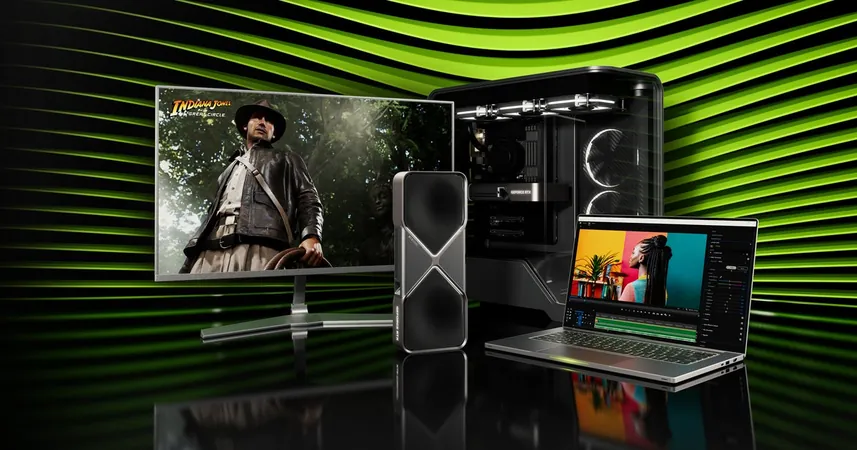
Nvidia Unveils Game-Changing RTX 50-Series Graphics Cards Featuring Revolutionary DLSS 4 Technology
2025-01-07
Author: Ling
Nvidia Unveils Game-Changing RTX 50-Series Graphics Cards Featuring Revolutionary DLSS 4 Technology
In an electrifying announcement during its CES 2025 keynote, Nvidia has officially unveiled its highly anticipated RTX 50-series desktop graphics cards, featuring groundbreaking technologies that promise to redefine gaming performance. The new lineup comprises four models: the flagship RTX 5090 priced at $1999/£1939, the RTX 5080 for $999/£979, the RTX 5070 Ti at $749/£729, and the RTX 5070 available for $549/£539. Each of these 'Blackwell' series cards is outfitted with cutting-edge GDDR7 memory and boasts ambitious frame rate enhancements through the newly introduced DLSS 4 multi frame generation.
Unprecedented Performance Claims and DLSS 4 Multi Frame Generation Explained
The RTX 5090 is poised as the ultimate choice for gaming enthusiasts, equipped with an astonishing 32GB of GDDR7 memory built around the powerful GB202 GPU. This model flaunts a staggering 92 billion transistors compared to the RTX 4090's 76 billion, with a remarkable 21,760 CUDA cores. Nvidia claims the 5090 can deliver double the frame rates of its predecessor, potentially achieving an astounding 4K at 240Hz with maximum settings in compatible titles.
But how does this technology work? DLSS 4 multi frame generation supplements traditional rendering by generating up to three additional frames for each original frame, enhancing visual fluidity. This innovation, similar to previous frame generation technology, requires seamless integration by developers and the support of Nvidia's Reflex 2 to mitigate latency issues effectively.
Power and Design Innovations
Interestingly, the RTX 5090 has a total graphics power rating of 575W, right at the threshold of PCIe 5.0's 600W limit, which is 125W above the RTX 4090. Despite this significant power draw, the Founders Edition is designed to be more compact, fitting within a two-slot form factor that may appeal to users with smaller PC cases—though a robust 1000W PSU is still recommended.
The RTX 5080, on the other hand, aims to deliver similar doubling of frame rates when compared to the RTX 4080, shining particularly in demanding RTX titles such as Cyberpunk 2077 and Alan Wake 2. This card, built on a smaller GB203 die, contains 16GB of GDDR7 memory and 10,752 CUDA cores, and operates at a rated power of 360W, again making it a powerhouse in its price segment.
A Sneak Peek at the RTX 5070 Series
For budget-conscious gamers, the upcoming RTX 5070 Ti and RTX 5070 models promise substantial performance at lower price points of $749 and $549, respectively. The 5070 Ti will utilize a trimmed version of the GB203 GPU, while the 5070 uses the GB205 architecture. Notably, Nvidia asserts that the 5070 should rival the performance of the RTX 4090, presenting potential savings for gamers eager for high-performance gaming without the hefty price tag—though thorough benchmarks are necessary to validate these claims.
Additionally, Nvidia has confirmed a separate line of RTX 50-series laptop GPUs set to arrive in March, featuring lower memory configurations tailored for portable gaming needs.
Architectural Enhancements Propel Performance
Beyond raw performance numbers, the Blackwell architecture introduces significant upgrades. These include enhanced shaders for improved execution, a tighter integration of Tensor cores, and advancements in ray tracing performance through new core designs that boast double the ray triangle intersection rates. With support for PCIe 5.0 and DisplayPort 2.1b UHBR20 ports, the RTX 50-series cards also match competitor offerings in terms of connectivity and bandwidth.
For tech enthusiasts wanting to dive deeper into the specifics of these architectural changes, Nvidia provides extensive information on its blog, and we can expect detailed analyses from trusted tech outlets following their hands-on tests.
Stay Tuned for More Updates on DLSS 4 Technology and Performance Testing!
Nvidia's unveiling marks a thrilling new chapter in GPU technology. We eagerly anticipate providing further insights into DLSS 4 multi frame generation as well as in-depth performance reviews in the coming weeks—stay tuned for more firsthand evaluations of these cutting-edge graphics cards that are sure to captivate gamers and tech aficionados alike!


 Brasil (PT)
Brasil (PT)
 Canada (EN)
Canada (EN)
 Chile (ES)
Chile (ES)
 Česko (CS)
Česko (CS)
 대한민국 (KO)
대한민국 (KO)
 España (ES)
España (ES)
 France (FR)
France (FR)
 Hong Kong (EN)
Hong Kong (EN)
 Italia (IT)
Italia (IT)
 日本 (JA)
日本 (JA)
 Magyarország (HU)
Magyarország (HU)
 Norge (NO)
Norge (NO)
 Polska (PL)
Polska (PL)
 Schweiz (DE)
Schweiz (DE)
 Singapore (EN)
Singapore (EN)
 Sverige (SV)
Sverige (SV)
 Suomi (FI)
Suomi (FI)
 Türkiye (TR)
Türkiye (TR)
 الإمارات العربية المتحدة (AR)
الإمارات العربية المتحدة (AR)